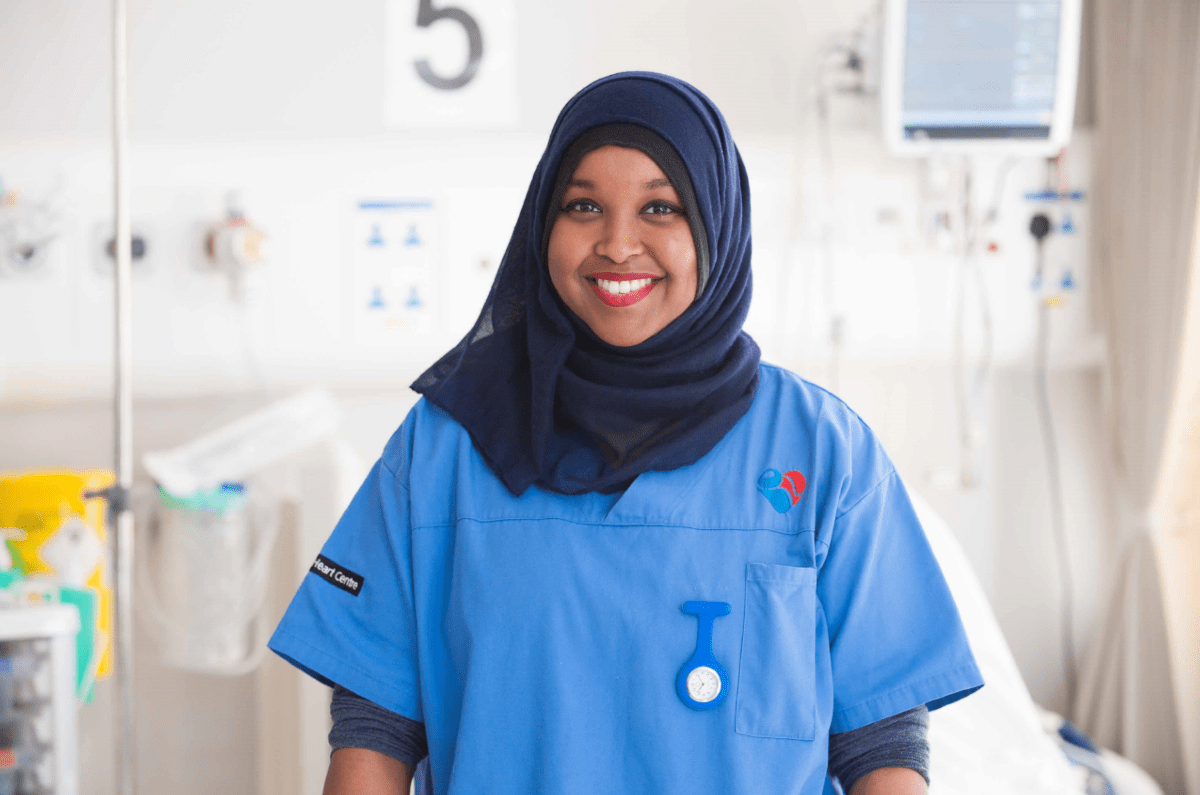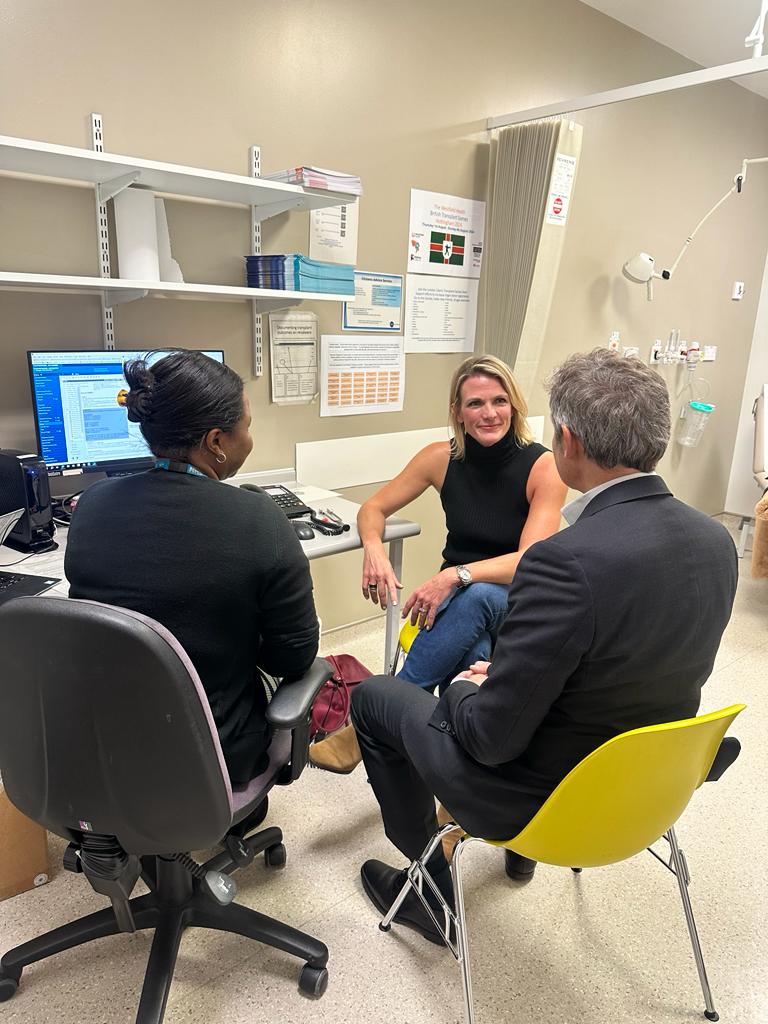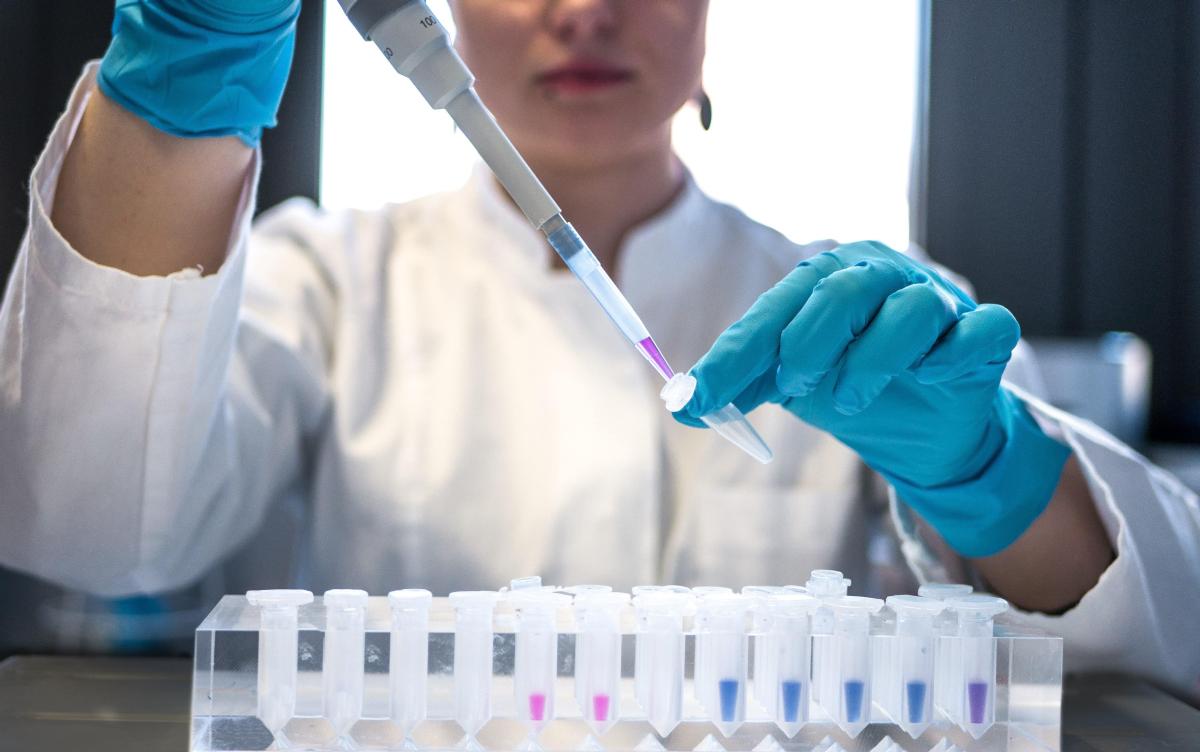Neurosciences service

Our neuroscience services
Pioneering medical and surgical treatments
for neurological conditions affecting the brain and spine
Neurosciences
The Barts Health Neurosciences Service is a leading specialist centre, offering pioneering medical and surgical treatments for neurological conditions affecting the brain and spine. Our patients come from London, Essex and further afield, for planned and emergency care.
Our neuroscience services are based at:
- Newham University Hospital
- St Bartholomew’s Hospital
- The Royal London Hospital
- Whipps Cross University Hospital
Why choose us
Neurological conditions and medical treatments can have a huge impact on day-to-day life, causing physical, cognitive and communication difficulties. We do everything that we can to support our patients’ rehabilitation, by offering access to a range of therapies.
Our neuro-therapists provide assessment and therapy for patients, whether they are receiving care in hospital at The Royal London or being seen at one of our clinics.
We devise treatment plans with realistic goals to suit individual needs – and we are always on-hand to offer advice and support.
The multi-disciplinary team includes:
- Neuro physiotherapists
- Neuro occupational therapists
- Neuro speech and language therapisst
- Neuro dietitians
Treatment may include:
- Acute assessment and therapy while patients are in hospital to enable them to achieve their optimum level of functioning
- Empowering patients to take control of their own rehabilitation pathway, with ongoing discussions between relatives and carers
- Provision of equipment and referrals to specialist equipment services
- Referrals and recommendations for ongoing inpatient and community rehabilitation
- Planning for safe and timely discharges.
When our patients are transferred to local hospital services, we do all we can to make the process as smooth and joined-up as possible.
For patients
We treat adults (over 16 years of age) with neurological conditions affecting their brain, spinal cord and/or nerves. We treat children for neurological conditions as part of our children's services. Our teams provide the full range of high quality services at several of our hospitals.
- Caring for patients with neurological conditions
- Pioneering surgery and treatments
- Gamma knife 'radiosurgery' treatment
- Videotelemetry (VT)
- Neurostimulator Service
- Clinical Neurophysiology Centre
- Barts Health Motor Neurone Disease Centre
- Neuromuscular Centre
- Multiple Sclerosis
- Contact us
Caring for patients with neurological conditions
We care for patients with neurological conditions and diseases affecting the nervous system - the brain, spinal cord, and all the peripheral nerves. We also care for patients with muscle disorders.
Our academic neurology department is headed by Professor Gavin Giovannoni, who is an international leader in the field of multiple sclerosis and neuro-inflammation.
As well as General Neurology clinics we have specialist clinics for:
- Multiple sclerosis and other neuro-inflammatory disorders
- Epilepsy
- Movement disorders including Parkinson’s disease
- Motor Neurone Disease
- Muscle and peripheral nerve disorders
- Headaches
Pioneering surgery and treatments
We provide the very latest treatments for brain and spinal cord conditions, in planned and emergency situations. Our team has expertise in carrying out the most advanced surgical techniques, as well as minimally invasive procedures.
All neurosurgery (except gamma knife treatment) is carried out at The Royal London Hospital. We use the most advanced technology, such as computerised image-guided surgery for the spine, which enhances patient safety and speeds up recovery times.
A number of pioneering treatments are also under development by our leading brain and spine surgeons, including using artificial joint technology for the cervical spine (neck).
Our treatments include:
Complex base of skull surgery - We are a multidisciplinary regional referral service for complex base of skull surgery. We work in collaboration with rhinologists, neuro-otologists, maxillo-facial surgeons, endocrinologists, plastic surgeons and neuroradiologists.
Minimally invasive procedures for spinal injuries - The Royal London is one of the country’s leading centres for treating major spinal injuries. We are continually pioneering new procedures, such as kyphoplasty – a minimally invasive treatment that involves injecting bone cement, through a small hole in the skin, into fractured spinal vertebrae. Recovery times are fast and the cement is eventually replaced by bone and so doesn’t need to be removed. Kyphoplasty can also be used to treat spinal problems caused by diseases like cancer or osteoporosis. We were one of the first hospitals to use this technique.
Minimally invasive surgery for pituitary tumours - We have pioneered a minimally invasive treatment for pituitary tumours in the brain by using endoscopes rather than traditional open surgery. This requires a small incision at the back of the nasal cavity and recovery times are fast. We are one of only a handful of centres using this approach and have treated more patients than anywhere else in Britain.
Neuroradiology - This involves the use of radiation, including scans and x-rays, to diagnose and treat neurological diseases.
Neurovascular surgery - We offer a multidisciplinary approach to cerebral aneurysms, AVMs (a blood vessel disorder of the brain) and other neurovascular malformations. Treatment is shared between neurology, neurosurgery, interventional neuroradiology and the gamma knife service.
Gamma knife 'radiosurgery' treatment
St Bartholomew’s Hospital is home to one of only very few facilities in the country to offer pioneering gamma knife treatments on the NHS. Gamma knife technology is non-invasive and can be used to treat many types of brain tumour, blood vessel disorders of the brain and facial pain. Patients who receive this treatment recover rapidly and usually go home the same day.
Videotelemetry (VT)
We have new state-of-the-art videotelemetry equipment. Videotelemetry is a technique that uses a combination of video recording and electroencephalography to monitor patients who have seizures. The technology helps us to make accurate diagnoses, so that our patients can then receive the most effective treatment for their condition.
During VT, patients remain in one room, and are monitored ideally until they have one or more of their habitual seizures. Medical staff are able to supervise their progress from a control room, observing by video camera and monitoring electrode recordings. By observation, and analysing the electrical traces when the patient has a seizure, medical staff can make a full diagnosis and determine the best treatment plan.
Neurostimulator service
Barts Health was one of the first trusts in the UK to use a pioneering technique called neurostimulation.
Neurostimulation is used to relieve pain and counteract the symptoms of neurological conditions like Parkinson’s disease or epilepsy. It can also be used to treat pain syndromes, bladder dysfunction and movement disorders.
The technique involves implanting a small ‘pacemaker’ under the skin. The device is then attached to peripheral nerves, the spinal cord or the brain to deliver periodic low voltage electrical stimulation. The electrical stimulation blocks the sensation of pain and can have an anti-seizure effect without the common sedative side effects of anti-epileptic mediations. In some cases, patients are given magnets that they can pass over the surface of the skin to turn the stimulator on if, for example, they know they are about to have an epileptic episode.
The neurostimulator service at Barts Health currently specialises in the treatment of epilepsy (vagal nerve stimulation) and chronic pain (dorsal column stimulation of the spinal cord).
Clinical Neurophysiology Centre
We run a specialist Clinical Neurophysiology Centre to diagnose and treat disorders of the nervous system.
We work closely with the neurology and neurosurgery teams by giving support in theatre with cerebral and spinal monitoring, and also with the diagnosis and management of epilepsy.
We use advanced techniques to closely monitor and record neurological patterns in our patients so that we can successfully diagnose and manage conditions and determine the most appropriate and effective treatment plans.
Electroencephalography - this is used for recording the electrical activity in different parts of the brain and converting it into a tracing called an electroencephalogram (EEG). The pattern of the EEG reflects the state of the patient’s brain and level of consciousness. It is mostly used in the diagnosis and management of epilepsy.
Evoked potentials – these are investigations carried out using different types of stimulus (light, sound and touch) to test the function of the central nervous system.
When your senses are stimulated, messages are sent from your eyes to the back of your brain. By testing and recording these electrical signals, we are able to find out if there are any abnormalities along the visual pathway. The investigations are carried out by a specially trained clinical physiologist.
Electromyography – this involves recording the electrical activity of a muscle in order to diagnose various nerve and muscle disorders and to assess progress in recovery from some forms of paralysis.
Barts Health Motor Neurone Disease Centre
The Barts Health Motor Neurone Disease (MND) Centre, sponsored by the MND Association, is one of the country’s leading MND specialist centres. It is a regional centre, attracting people from across London, Essex and further afield.
We work in multidisciplinary teams, in a coordinated way. Each patient is seen by a variety of different specialists – as this has been shown to provide the greatest benefits.
Through successful teamwork, we can cater for our patients’ complex needs in one centre of excellence.
Our team can provide patients with:
- a fast diagnosis
- ongoing monitoring of their disability
- ongoing monitoring of their respiratory function and non-invasive ventilation
- nutritional support including placements of gastrostomy tubes
- access to support services, including occupational therapy, physiotherapy and speech and language therapy
- palliative care
The Directors of the Centre are Dr Aleksandar Radunovic and Dr Andrea Malaspina – they are both Consultant Neurologists and leading experts in the care of patients with MND.
Neuromuscular Centre
Our Neuromuscular Centre provides exemplary care for patients with muscle and peripheral nerve disorders. It is a regional centre, attracting people from across London, Essex and further afield.
We run one-stop clinics where patients have medical consultations, and undergo appropriate investigations such as:
- Neurophysiology (the study of the nervous system function)
- Muscle biopsy (for diagnostic purposes, or to check on the progress of disease)
- Skin biopsy (to test for small fibre neuropathy, a nerve disorder that can cause pain and pins and needles).
- Patients are also seen by physiotherapists and occupational therapists on the same day.
The Neuromuscular team work closely with respiratory physicians, cardiologists, interventional radiologists and orthopaedic surgeons – to achieve the best outcomes possible for our patients.
We care for a number of patients on intravenous immunoglobulin and immunomodulatory therapies on our day unit (11D), and have begun transitioning patients to home-based subcutaneous immunoglobulins.
We hold an online peripheral nerve multi-disciplinary team meeting once a month, to discuss complex patients and recommend treatment plans for patients across London and Essex. This meeting involves consultant neurologists, neurophysiologists, haematologists, histopathologists and therapists (when required).
Multiple Sclerosis
Contact us
The Royal London Hospital
Inpatient services
Location: 12th floor – wards 12E and 12F
Ward 12E
Tel: 020 359 42862/3
Fax: 020 359 42872
Ward 12F
Tel: 020 359 42847/8
Fax: 020 359 42855
Location: once you have entered the building follow the signs to lift core 5 and take a lift to the 12th floor. You will see signs for Ward 12E or Ward 12F.
Whipps Cross University Hospital
Location: Our neurology outpatient clinics are located in the main Outpatients department in the Yellow Zone. Access is from Hospital Road.
Outpatients: 020 8535 6768
Here’s how to find Whipps Cross University Hospital, whether you are travelling by car or public transport.
MND Centre
Location: 11th Floor, Therapy Department
Tel: 020 3594 1883
Fax: 020 3594 2153
Email: MNDClinic@bartshealth.nhs.uk
Neuromuscular Centre
Tel: 020 3594 1194
Fax: 020 3594 2153
For clinicians
For routine outpatient referrals please use eRS.
Out of hours
If it is outside office working hours and you need specific and urgent advice, then please contact the neurosurgical registrar or the neurology registrar on-call. They can be contacted via the switchboard on 020 3416 5000.
Multiple sclerosis

Multiple sclerosis
Multiple sclerosis is a disease affecting the brain and spinal cord. It is associated with areas of inflammation affecting the transport of impulses along nerves. People with MS often develop lasting symptoms, including problems with thinking (cognition) and chronic tiredness.
We understand that an MS diagnosis can feel overwhelming. But our team are here to suport you. The BartsMS team provides comprehensive support to people with MS in our local communities, covering Tower Hamlets, City and Hackney, and Newham.
We are also happy to see people from elsewhere in the UK, whether it's for a second opinion or to participate in a clinical trial.
Meet the team and find support
We understand that an MS diagnosis can feel overwhelming. But our team are here to suport you. The BartsMS team provides comprehensive support to people with MS in our local communities, covering Tower Hamlets, City and Hackney, and Newham.
We are also happy to see people from elsewhere in the UK, whether it's for a second opinion or to participate in a clinical trial.
For information or any issues related to your clinic appointments or if you need a copy of your clinic letter, please contact the team on telephone number: 020 3594 1195/0203 594 1196 or bhnt.neuroscienceppc@nhs.net
You can also email the coordinator that works with your consultant:
- Ms Gail Guazzelli, working with Professor Schmierer
- Ms Patricia Williams-Falokun, working with Professor Giovannoni
- Ms Betty Williams, working with Dr Marta
- Ms Karen Wong, working with Dr Dobson & Dr Gnanapavan
- Ms Hayley Woods, working with Dr Turner
Multiple sclerosis

Clinical trials for MS
We carry out lots of clinical trials for people with MS – trials for those who are recently diagnosed and trials for those who have had for MS years. While we offer trials for people at all stages of their MS journey, in order to take part in a clinical trial, you must meet a set of defined characteristics known as the eligibility criteria.
To find out what MS clinical trials we offer at Barts Health and who can take part in them, check out section 5 of our BartsMS Navigator, email our clinical trials team, or speak to your medical team directly.
You can also learn out more about what taking part in research involves – and all the different ways you can do it – on our Research at Barts Health webpages.
